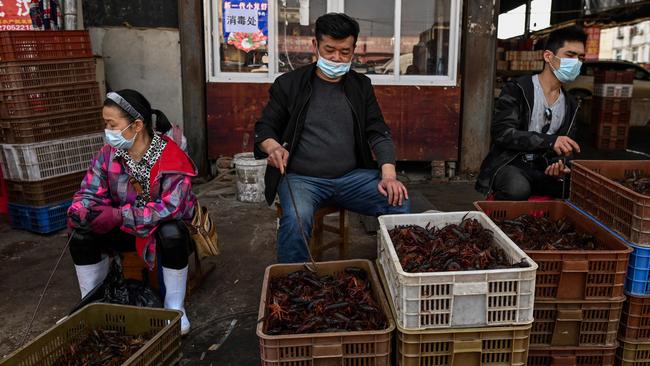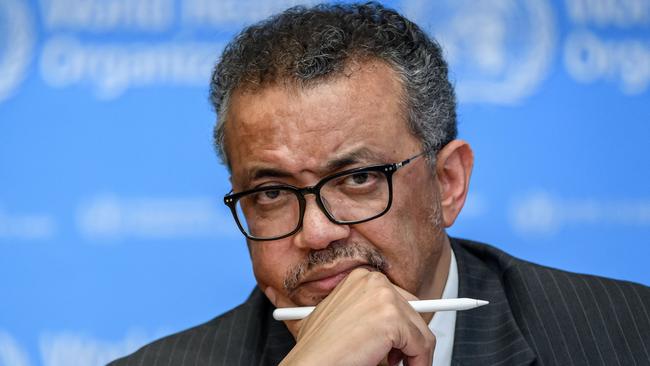The secret history of the World Health Organisation
If you think the World Health Organisation’s coronavirus failings are anything new, think again. The global bureaucracy has been dropping the ball for decades thanks to politics and incompetence, writes James Morrow.
Rendezview
Don't miss out on the headlines from Rendezview. Followed categories will be added to My News.
Having let itself be used by the Chinese Communist Party to slow-walk news of the COVID-19 coronavirus pandemic, the World Health Organisation now wants to make sure that in isolation we don’t marinate ourselves silly.
A few days ago the WHO and their proxies lit up social media feeds with a series of anti-alcohol messages: “Be resilient without alcohol!”, “Stay healthy at home – avoid or reduce alcohol consumption!”, “Do not use alcohol as a way of dealing with your emotions or stress!”, that sort of thing.
Predictably, media outlets around the world bit at the story, and local anti-alcohol lobbies like FARE issued their own releases calling for moderation and regulation.
Perhaps the WHO’s new slogan should be, ‘wet markets good, dry martinis bad’.
Now while it all seems a bit silly – this is a stressful enough time without a health bureaucrat peering over your shoulder at the end of the day – it’s worth noting a couple of things.
First of all, under pressure, local policy makers are often apt to go off on a frolic and take this sort of advice seriously, and people react accordingly.

A few Sundays ago, back when the reality of the coronavirus crisis was still crystallising and no one knew exactly where the states would wind up landing when it came to the definition of “essentials”, bottle shops across the country were flooded with panic buyers who not unreasonably thought their premier might decide that everyone should go through their lockdown stone cold sober.
But the second and more important point is that this sort of lifestyle policing (even more than the baleful influence of the WHO’s putative communist puppet-masters in Beijing) distracts the body from doing its one job, namely, preventing crippling global pandemics.
And this is not the first time it’s happened.
Amazingly, we have been in this same situation – highly contagious respiratory disease and a highly politicised and thus largely useless WHO – before.
Just as now, in the wake of the SARS crisis of 2003, the WHO copped serious criticism for taking its eye off the ball and failing in its core mission, all because of politics.
And again, then as now, analysts noting its failures pointed out that the agency’s shift away from its core business towards trendy causes and lobbying for the regulation of private habits meant that it had less time, money, or interest in preventing pandemics.

While much has been made of the outfit’s ever-closer ties to Beijing, less has been remarked about the WHO’s leftward drift to become just another advocacy group for causes like climate change (remember that?) and lifestyle regulation.
Since the second half of the last century, the WHO has moved its focus increasingly from what most people would consider traditional health problems to focus on scolding people for their decadent and dangerous Western lifestyles.
In 1978, the WHO adopted a document called “World Health for All by 2000”, which sounds like a noble goal, but becomes more creepy the deeper one reads into it.
The document stated that “all governments will have assumed overall responsibility for the health of their people through influencing lifestyles and controlling the physical and psychosocial environment” – this may very well have been the birth of what we now call the modern nanny state – and even called for “the fundamental reorganisation of human relationships in the world through the search for a New International Economic Order.”
With this new mandate to remake the world rather than heal it, it is no surprise that by the mid-1990s, the WHO was described by the British Medical Journal as “a morass of petty corruption and ineffective bureaucracy.”

In 2002, just a year before the SARS pandemic, the WHO’s World Health Report was predicting unsafe sex, obesity, and high cholesterol would soon be among the world’s top ten killers, specifically targeting “the deadly forces of tobacco and excessive alcohol consumption”.
It was around this time that the WHO also began to shift its focus away from the developing world, where life and limb are far more under threat as matter of course, to the sins of the West, with disastrous consequences.
As 2003 report in The New Atlantis pointed out, “WHO’s lifestyle initiatives consume resources that could better be used elsewhere. The Roll Back Malaria initiative itself has been hamstrung for lack of funds. In July, WHO director-general Jong-Wook Lee announced that the organisation’s Global Polio Eradication Initiative required an additional $210 million to maintain its polio immunisation and surveillance programs. These are the challenges the WHO is best equipped to confront, and should be the central focus of the organisation. Polio, unlike smoking, is an actual disease — and a scientific organisation should be able to tell the difference.”
Fast-forward to 2020, and the WHO is even less useful, having been hollowed out not only by the leftward drift of decades, but its increasingly tight relationship with China.
The great irony is that in focusing on lifestyle diseases, the WHO has helped cost many lives.

